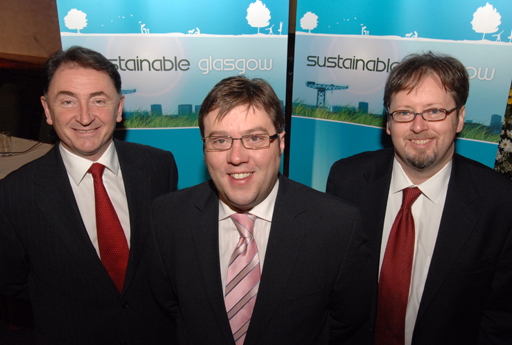Sustainable Glasgow partnership

left to right: Professor Jim McDonald, Steven Purcell, Richard Bellingham
The Sustainable Glasgow initiative, spearheaded by Strathclyde University in partnership with energy groups and Glasgow City Council, aims to make Glasgow one of Europe's most sustainable cities within 10 years.
Cities are major concentrations of people and resources and as such consume 75% of the world's energy as well as being responsible for 80% of greenhouse gas emissions. Glasgow is responsible for about 8% of Scotland's carbon emissions and it is thought this will only increase unless action is taken. Based on a detailed analysis of the city's resources, infrastructure and pattern of energy demand, Sustainable Glasgow has taken an unparalleled strategic approach to drive down carbon emissions and yet meet the city's future energy needs.
Richard Bellingham, project director and senior research fellow with the Fraser of Allander Institute at Strathclyde, started work on the initiative in autumn 2008 preceded by discussions with the various partners to get them on board. Funding from Glasgow City Council started off the project while the energy partners provided resources in kind, such as data and information.
Richard said, "The university led this but it's been a partnership from the start. From the university's point of view it's been an interdisciplinary study, not particularly just a business study. We identified opportunities and then looked at business models, finance models, to turn them into something real. We also had to look at the sociological side and people's attitudes to climate change. Surveys were carried out by the university's sociology department which found you can't treat everyone the same, people have a whole range of different attitudes to climate change and we have to treat different groups differently to get them on board."
The city was looked at as a whole and carbon use was identified as being highest in the centre, reflective of the economic activity within that area.
Recommendations in the report include the creation of systems to turn the city's sewage and municipal waste into biogas, development of a district heating system for the city starting in five identified zones, increased use of biogas and electrically powered vehicles and creation of urban woodlands in the city's vacant land.
"What we suggested had to be technically and financially feasible. You can do anything with technology but it has to be viable financially. In terms of district heating, we needed a critical mass of anchor customers; by that we mean big institutions who are going to be here long term and investing in the future, so that means universities, colleges, hospitals and so on. Everything will be designed so organisations can plug in when they are ready.
"We also looked at vacant land in Glasgow - 8.5% of the city is vacant land, some of which has been lying vacant for 30 years. We're looking to plant these areas with trees and create urban woodlands not only so it looks better, but to create recreational space and also biomass which can be used in energy systems at a later stage."
Richard emphasised that a highly important aspect of Sustainable Glasgow is the partnerships involved. "This is a major investment in the city and everyone has to be on board. Strathclyde University, Glasgow City Council and the energy companies worked together to do the study, and now we are involving a wide range of other partners, such as Glasgow Housing Association and the NHS - partners with a major investment in the city."
The report was launched on January 27 by Professor Jim McDonald, University of Strathclyde Principal, Steven Purcell, Leader of Glasgow City Council, Jim Mather, Minister for Enterprise, Energy and Tourism, and Joel Scheraga from the US Environmental Protection Agency, along with other consortium partners and more than 150 industry leaders.




